THERMAL SHOCK TESTING
1. Evaluating Material Durability Under Temperature Variation
During product development and testing, assessing the durability and resistance of materials under harsh environmental conditions is essential. One of the most commonly used methods is Thermal Shock Testing.
2. Thermal Shock Testing – Evaluating Resistance to Sudden Temperature Changes
Thermal shock testing simulates rapid and sudden temperature changes — from high to low temperatures or vice versa — within a very short period of time.
The goal of this test is to determine whether a product or material can withstand thermal stress caused by abrupt expansion and contraction, which can lead to cracking, breakage, coating delamination, or solder joint failure.
Typical Applications:
Electronic components such as PCBs, ICs, capacitors, resistors, etc.
Automotive parts, especially engine components exposed to high heat
Technical ceramics, sensors, and similar products
The test is typically conducted by repeatedly transferring the test item between two chambers with a large temperature difference — for example, from -40°C to +150°C — over multiple cycles.


3.Advice:
If your product frequently encounters sudden temperature changes (such as moving from indoors to outdoors or engine startup), thermal shock testing will be more suitable.
Testing Contact
You can contact GSTV for quick consultation and to receive testing quotations tailored to each specific product type.
Global Standard Vietnam Inspection Services Co., Ltd.
Hanoi: Lot C1-11, Duong Lieu Industrial Cluster, Duong Lieu Commune, Hoai Duc District, Hanoi City.
Tel: +84 911 531 688
CONTACT
Hanoi: Lot C1-11, Duong Lieu Industrial Cluster, Duong Lieu Commune, Hoai Duc District, Hanoi City
Service
Subscribe to newsletter
© 2025. All rights reserved.
Reliability testing
Failure analysis
Chemical analysis
Material analysis
International certification
The customer requests services and a quotation.
